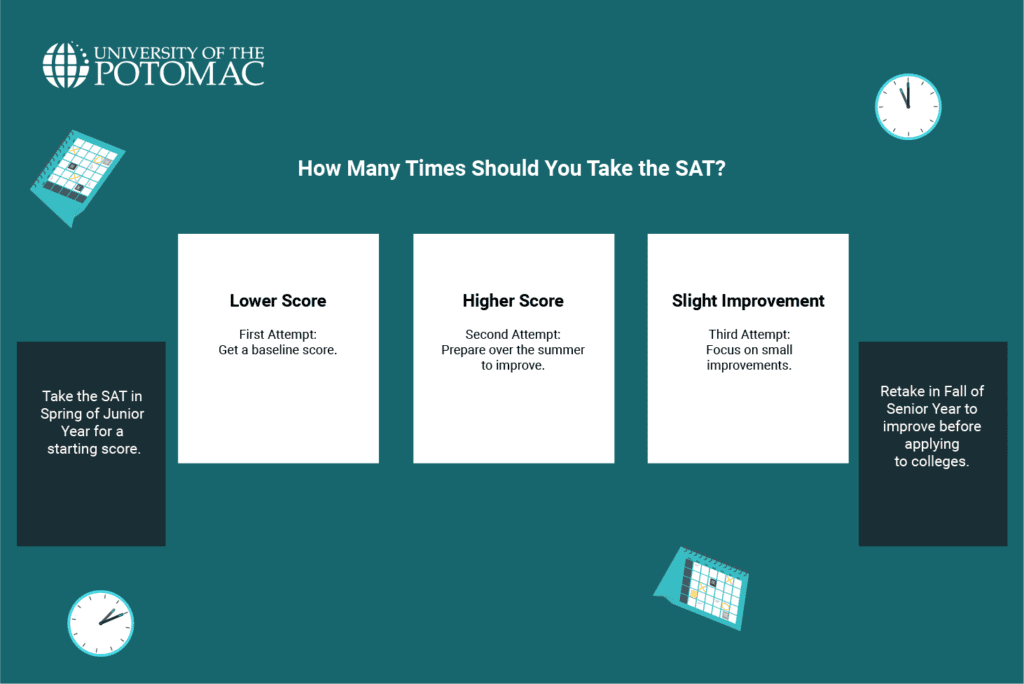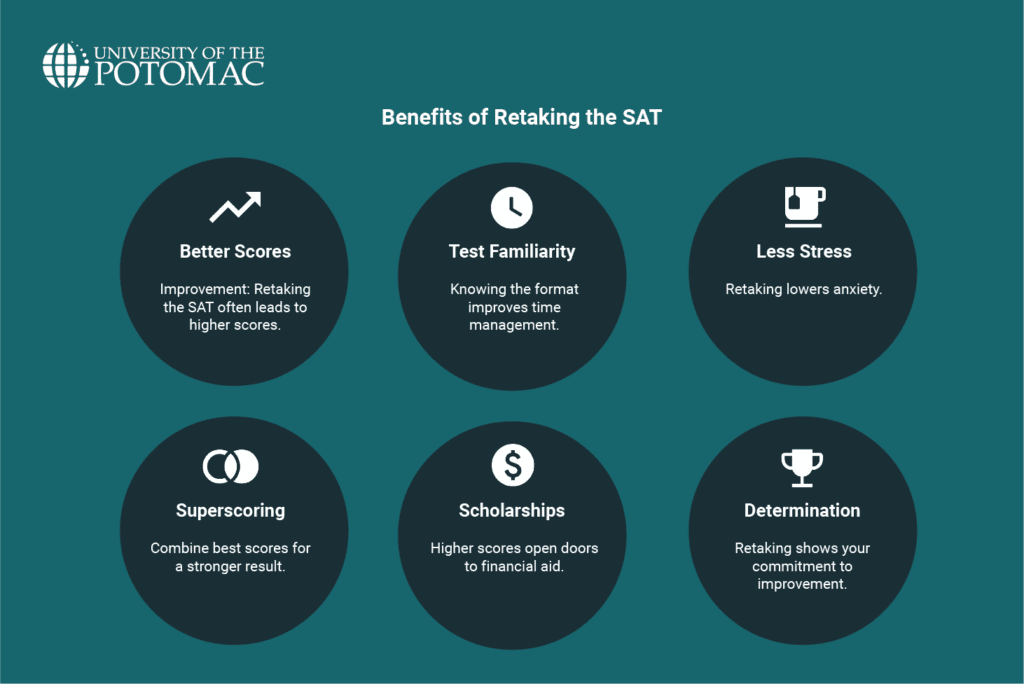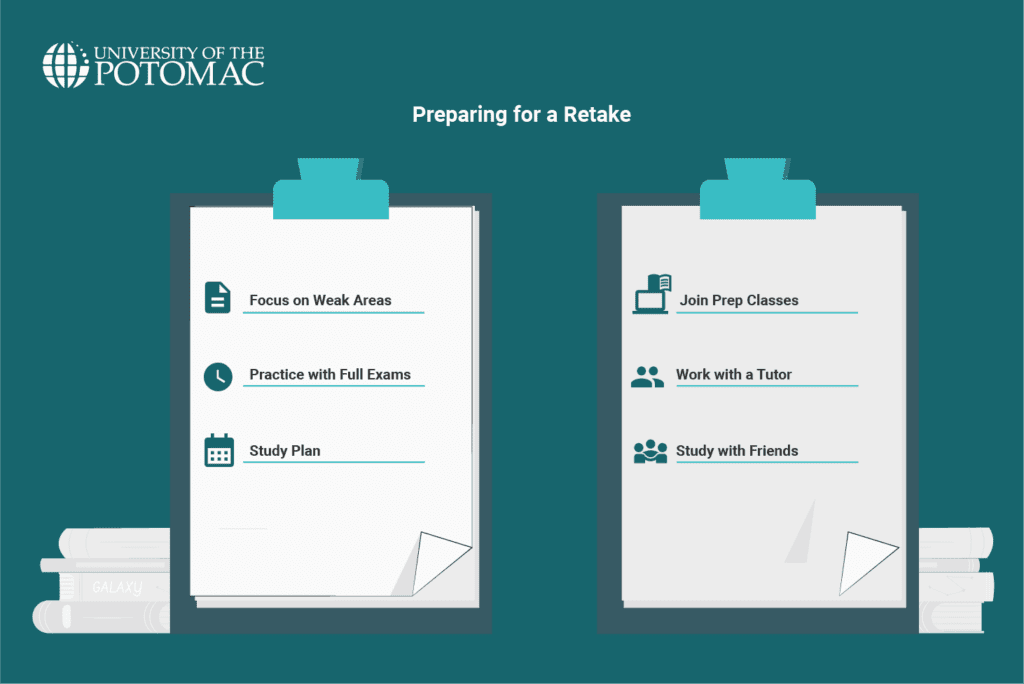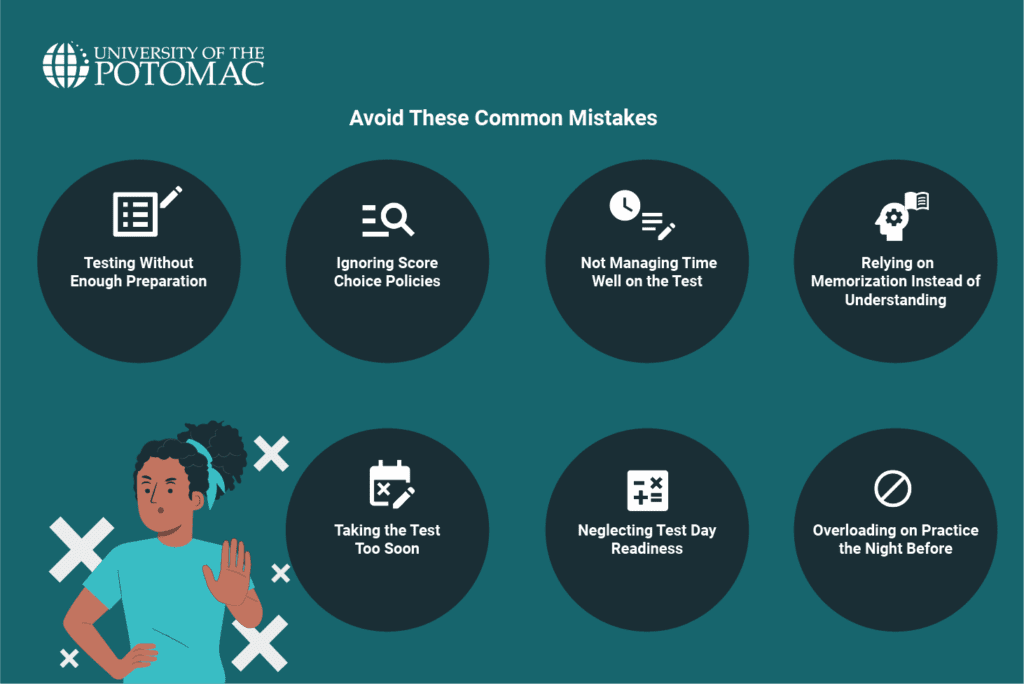- Improved Scores: Retaking the SAT often leads to higher scores, especially with superscoring, which combines your best section scores.
- Strategic Retakes: The SAT can be taken multiple times, but retaking it 2 to 3 times is usually enough to improve without added stress.
- Preparation is Key: Focus on weak areas, practice with full exams, and use prep resources to boost performance.
- Avoid Mistakes: Avoid retaking without preparation, mismanaging time, or relying only on memorization.
Did you know that, in 2023 alone, 1.3 million students took the SAT? This massive number of test-takers shows that the SAT continues to be an important element of getting into a college across the United States.
The SAT continues to be an important part of college admissions as it helps schools measure how ready students are for college. However, due to its difficulty, many students decide to retake the test to get a better score, meet scholarship requirements, or feel more comfortable on test day.
In this guide, we break down how many times you can take the SAT, why retakes can be beneficial, and how to make the most of each attempt.
How Many Times Can You Take the SAT?
The College Board has a no-limit retake policy for the SAT, which means students can retake it as many times as they want. This is great news for students who want to retake the SAT and aim for a better score.
On average, students who retake the SAT improve their scores by 40 points, with 4% of students increasing their scores by 100 points or more.
While taking the chance to improve your SAT score might be a good idea, keep in mind that by retaking the SAT too many times without being prepared, you risk:
- Unnecessary stress
- Not improving your score
- Spending time and money for each retake
How Many Times Should You Take the SAT?

Students are usually advised to take the SAT 2–3 times to get their best score without extra stress or costs. Retaking the test helps improve weak areas and lets you benefit from superscoring, which combines the highest section scores from different attempts, resulting in the best score possible.
A good strategy is to take the SAT for the first time in the spring of your junior year to get a starting score and use the summer to prepare. A second attempt in the fall of the senior year gives you a chance to improve before college applications, and on your third try, if needed, you can focus on small improvements.
Deciding to Retake the SAT
Retaking the SAT is a personal decision based on individual goals and previous performance. You may choose to retake the SAT to meet the score requirements of your target college, especially if it’s a competitive school, or you want to take advantage of superscoring. Moreover, with a higher SAT score, you might be eligible for certain scholarships and financial aid.
You may also want to retake the SAT if you feel like your score doesn’t reflect your potential because you were anxious, sick, or faced other problems during the test.
Moreover, a good use of a retake is to determine what are your weak areas and channel your energies into getting better at them. There are numerous online tools, such as Khan Academy, that can help you study for the SAT.
Benefits of Retaking the SAT

There are many benefits to retaking the SAT, from achieving a higher score and strengthening your college application to scholarship opportunities and showing determination. Let’s dive deeper into some of the key benefits:
Better scores
Retaking the SAT often leads to higher scores. Many students perform better on their second or third try because they know what to expect during the exam.
Moreover, they are aware of which areas they need to improve, so during the study period, they can focus on improving their skills and knowledge in those sections.
More comfortable with the test
The first SAT can feel stressful, but retaking it often feels less scary. Taking the SAT again means you’ll already be familiar with the test format, timing, and question types, which subsequently, helps reduce anxiety and allows you to perform better.
This makes it easier to manage your time and stay focused during the exam.
Higher superscore
As we mentioned above, many colleges use superscoring, which means they combine your best section scores from different test dates. This means that even if you only improve one section during your retake, your overall score can increase, making your application stronger.
Besides, retaking the SAT shows colleges that you’re willing to work hard to improve. This can leave a good impression and show you’re serious about doing your best.
Scholarship opportunities
Better SAT scores can also help you qualify for scholarships and financial aid. This means, that though you may spend money for retaking the SAT, looking at the long run, it can help you save money on college costs.
Preparing for a Retake

Getting ready for an SAT retake is a chance to improve your score by learning from your first attempt. Using the right strategies can help you do better on test day. Here are some tips to follow:
Focus on weak areas
The first step is to identify the sections where you scored the lowest and spend extra time studying those topics. Use your score report to see where you need the most improvement. This way, you ensure you don’t waste time on topics you already know well.
Use practice exams
Another key action you can take is to take full-length, timed practice tests to simulate the actual test-day experience. By mimicking the day of the test, you become familiar with the test format, while also improving your time management skills.
After each test, review your answers thoroughly to identify mistakes and then focus your study time on improving those areas.
Make a study plan
Nothing great can be achieved without a consistent routine, and this applies also to your SAT preparation. So, before starting your SAT preparation, create a study schedule that fits into your daily life.
The best strategy is to divide your time between subjects and allocate more hours to areas you need to improve. With a consistent schedule, you can ensure steady progress and reduce last-minute cramming, which can elevate stress and anxiety.
Interested in pursuing a degree?
Fill out the form and get all admission information you need regarding your chosen program.
This will only take a moment.
Message Received!
Thank you for reaching out to us. We will review your message and get right back to you within 24 hours.
If there is an urgent matter and you need to speak to someone immediately you can call at the following phone number:
- We value your privacy.
Join prep classes or work with a tutor
There is a whole economy related to helping you prepare for the SAT, and you can leverage these opportunities during your studies.
For example, SAT prep classes provide structured learning and provide access to expert guidance. Through these classes, you can learn effective strategies that help you tackle tricky questions, manage anxiety on test day, and provide effective feedback to guide your progress.
Alternatively, if you are a more individual learner, you can hire a tutor. An SAT tutor can give you personalized help, explain tough topics, and share tips for doing better. Tutors are especially helpful if you need extra support in a specific section of the test.
Avoid These Common Mistakes

While all students who retake the SAT do so in hopes of improving their scores, not everyone accomplishes that. To be more successful on your second (or third) attempt, you have to work harder and avoid the mistakes you made the first time.
Testing without enough preparation
Although this is kind of a given, many students still jump into a retake without preparing, assuming they’ll do better naturally. However, to improve your score, you must do better than last time, which means either putting more work in or working more efficiently.
To avoid this, start by creating a study plan, including the tips we suggested above.
Ignoring score choice policies
Superscoring is a great policy, but unfortunately, many students don’t know how to take advantage of it. To avoid stress, research how superscoring works and how you can use it to your advantage.
In addition, research the score submission policies of your target schools and only send the scores that best reflect your abilities.
Not managing time well on the test
Taking a test is stressful enough, and poor time management only adds gas to the fire. If you don’t manage your time wisely, you risk ending up with unfinished sections or making careless mistakes. This is why we mentioned above that practicing with timed exams is crucial.
Relying on memorization instead of understanding
While memorizing the material can come naturally for some, it’s not the best approach for the SAT due to the intensity of the test.
Your memory can fail you, but actually understanding the formulas and concepts gives you a better chance of recalling information and doing well on your test. Focus on learning how to apply key ideas, especially in math and reading comprehension, so you can handle unexpected questions.
Taking the test too soon
The whole point of retaking the SAT is to do better than the last time, so if you don’t give yourself enough time to prepare, that might not happen. Schedule your next test date strategically, calculating enough time to study and practice before the test.
Neglecting test day readiness
While everyone may feel some level of stress during the test, it’s important to minimize it as much as possible. Being ready for your test day and having everything you need (such as ID, calculator, admission ticket, etc) on you is a great way to do so.
Although the pressure from the test day might push you to pull an all-nighter the day before, don’t. Cramming the night before the test can lead to burnout and fatigue, which can diminish your brain power and result in low scores.
Conclusion
Retaking the SAT can help you reach your college goals, but it’s important to plan and prepare carefully. Focus on improving your weaker areas, practice with full tests, and use helpful resources like prep courses or study groups.
Keep in mind to not overdo it—too many attempts without progress can cause burnout. Check your scores, know what your colleges require, and have a solid study plan before deciding to retake. With the right approach, each attempt can bring you closer to the score you want and new opportunities.
Frequently Asked Questions
Do colleges see how many times you take the SAT?
Yes, colleges can see how many times you take the SAT, but they typically focus on your highest score.
How many times does the average person take the SAT?
The average person takes the SAT about 2-3 times.
How much does it cost to retake the SAT?
Retaking the SAT costs $60, though fee waivers are available for eligible students.










